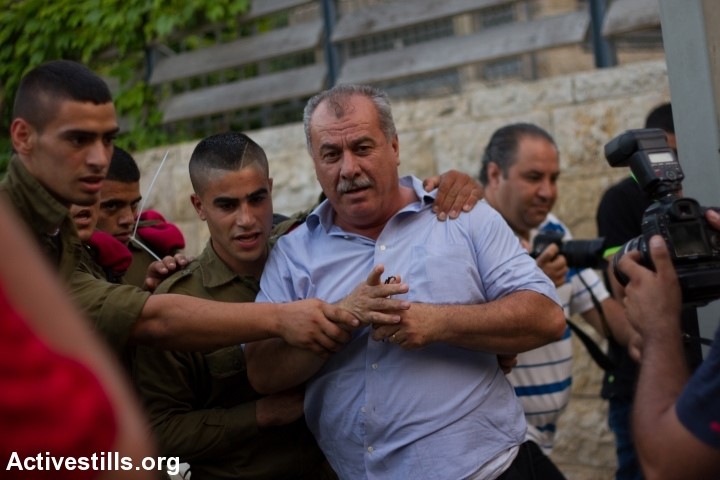Originally published by Ma’an News Agency on May 23, 2014.
BETHLEHEM (Ma’an) — On Sunday, Israeli soldiers invaded the streets of Haifa’s upmarket German Colony neighborhood, beating Palestinian protesters with batons and lining them up blindfolded along the now blood-splattered sidewalks. An Orthodox priest came forward intermittently to direct the soldiers’ violence, and a number of youths were even interrogated on the street itself as hundreds of passerby watched in horror.
The scenes of violence in northern Israel’s largest city, however, were not the result of a fresh government crackdown on Palestinian activism or a new surge of protest from the left. The attacks were part of a well-choreographed street performance organized by Palestinian youth to bring the realities of the occupation home to Israel’s cities.
The campaign, called Tzahal Ma Byestahal (“The Israeli army isn’t worth it”), seeks to drum up opposition to recent attempts by the Israeli government to introduce mandatory army enlistment for the 1.4 million Palestinians with Israeli citizenship.
Amjad Shbieta, the general-secretary of the Communist Party that has been the organizing force behind the performances, told Ma’an in a telephone interview that the campaign is a response to the government’s attempts to break apart the Palestinian community inside Israel on religious lines by introducing service for Christians, who compose about 10 percent of the total Palestinian population.
“The government began a war against our national unity by calling for military service for certain groups,” he said, highlighting that both mandatory enlistment that began for Druze Palestinians in the 1950s and talk of introducing similar legislation for Christian Palestinians today are part of a plan to divide Palestinian society.
“They are trying to provoking sectarian conflict between and among the united Palestinian people by getting Christian youth to sign up,” he argued.
When the Israeli Knesset passed a law in February identifying Christians as a separate ethnic group apart from other Palestinians, similar to the situation of the Druze, and the army followed up by distributing voluntary recruitment forms to all Christian youth in April, the fears of many that the Israeli government was trying to divide Palestinians on religious grounds yet again began to materialize. In response, the Communist party sprung into action.

“The idea for the street performances began when we realized that we needed to do something completely out of the ordinary in order to reach out to youth who do not participate in traditional political activities,” Shbeita said.
The group decided to organize a series of 26 performance pieces involving scenes from army life, including home demolitions, arrests, beatings, and detention of Palestinian civilians. So far, Tzahal Ma Byestahal has been exhibited in both Nazareth and Haifa, and the group plans to show it in other cities as well. The Haifa performance entailed the participation of about 70 artists and approximately 2,500 audience members in total in all of the scenes, Shbeita told Ma’an.
“There was widespread participation in the event from all religious groups — Muslims, Christians, and Druze — as well as from all regions, including the North, the Negev, Jerusalem, and the West Bank, among others,” he added.
When performed on the streets of Israeli cities, the scenes are a chilling reminder of the daily violence committed by Israeli soldiers in towns and villages only a few kilometers away. Unlike many protests organized by the Israeli left, however, Tzahal Ma Byestahal is unique in that it targets Palestinian citizens of Israel themselves, with dialogue primarily in Arabic.
One of the most unnerving aspects of the performance is the presence of a man in the garb of Greek Orthodox priests loudly inciting the violence in a number of scenes. His inclusion is a not-so-subtle reference to Gabriel Nadaf, a Greek Orthodox priest who was sacked from his position by the church on May 8 for his vocal support for the enlistment of Palestinian Christians into the Israeli forces.
The presence of a Christian religious official in the scene highlights the view of organizers that encouraging army enlistment is tantamount to supporting occupation and the daily brutality it entails, directly and explicitly locating those priests that call for Christian enlistment in a logical sequence that ends with violence against fellow Palestinians.
Tzahal Ma Byestahal, however, is committed to opposing the enlistment of all Palestinians in military service, including Christians and Muslims as well as Druze, who are already forced to serve.As the performances came to an end on Sunday evening in Haifa’s Prisoner’s Square, hundreds gathered chanting, “Muslim, Druze, and Christian, national unity, against service” under the watchful eyes of “soldiers.”
All of a sudden, the performance began again — or did it? — when the soldiers charged the crowd and began seizing participants. Protesters fought back, repelling the invasion, and the soldiers eventually withdrew. Only then did they giggle nervously and remove their green army caps, revealing themselves again as participants in the show.
The blurred lines between reality and fiction, however, did not end with the performance itself. Shbeita told Ma’an that since the end of the shows, four participants in the group have been summoned for interrogation by the Shin Bet, Israel’s notorious secret services.
In the questioning, they were asked about their political involvement as well as their opinion on mandatory enlistment, which, given the fact that they were summoned for taking part in an anti-enlistment activity, seemed to be more of a naked scare tactic than anything else.
The summons, however, point to the state’s nervousness regarding a new wave of Palestinian political activism in recent months, and Tzahal Ma Byestahal in particular.
“This project in the streets scares the government because they don’t know how to respond,” Shbeita explained, adding defiantly: “But they did not weaken our spirit and we will continue the struggle.”